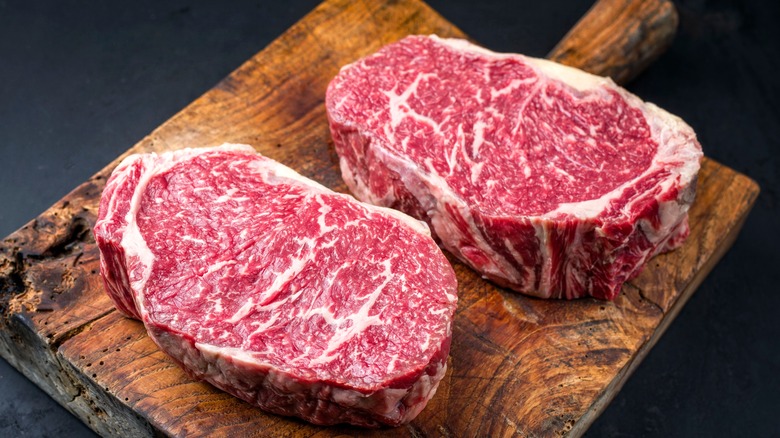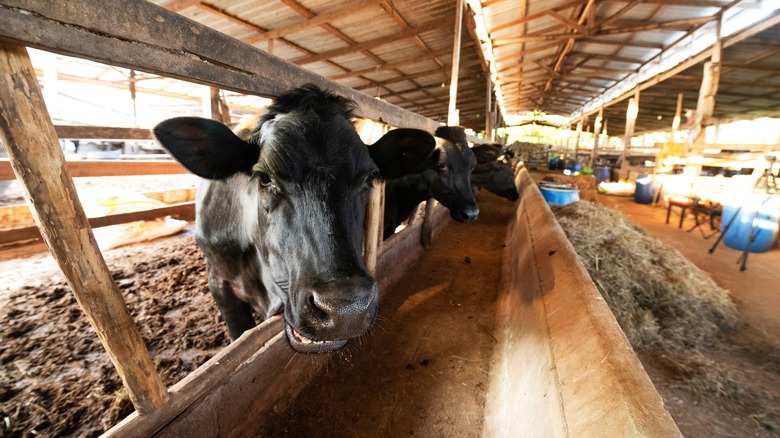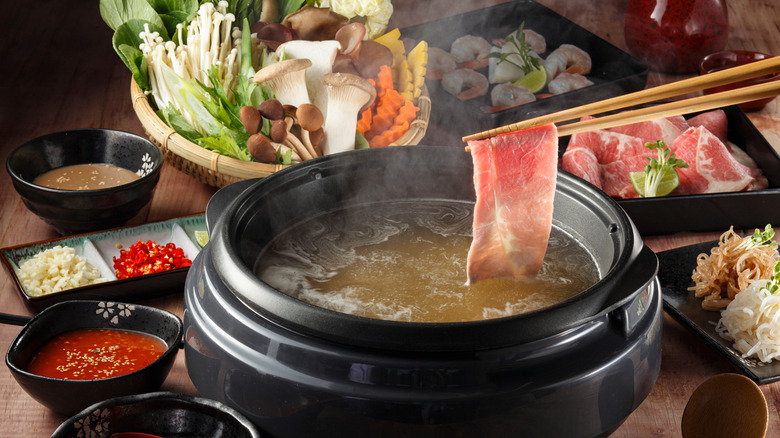Are The Terms Kobe Beef And Wagyu Beef Interchangeable?
Chances are, you ate beef recently, and eat it frequently. Statista reports that nearly 30 billion pounds of beef were consumed in the United States in 2019 alone. But it may surprise you that cattle were first domesticated in Southwest Asia in the ninth millennium BC, according to a study published in BMC Genetics. After domestication spread around the world, beef became a popular red meat in world cuisine. You'll find it served ground, sliced, stewed, roasted, braised, and more, and it's noted for its content of protein, iron, zinc, vitamin B12, and other beneficial compounds, Healthline reports.
For as many ways the world eats beef, there are just as many confusing terms circulating that can make it difficult to identify exactly what you're eating. For example, Angus refers to a popular breed of cattle from England (per AGDAILY), and Certified Angus Beef is a brand that requires a specific set of conditions for the label: The cattle must be Angus-related, mostly black in color, and meet ten standards of quality including appearance, texture, and leanness. Two other terms you'll encounter are Kobe beef and Wagyu beef, both referring to the world's most expensive beef (per MasterClass). So, what's the difference?
Kobe beef versus Wagyu beef
All Kobe beef is Wagyu beef, but not all Wagyu beef is Kobe beef. Wagyu translates to "Japanese cow," according to the American Wagyu Association, and MasterClass explains that the word refers to cattle breeds that originated in Japan. Thus, purebred "wagyu beef" is the meat of cattle native to specific regions of Japan, including Kobe, which is made from the black Tajima cattle of the capital city of the Hyogo Prefecture. Britannica adds that since Wagyu cattle have been exported worldwide, Japan ensured that the term "Kobe beef" may only be used in reference to meat raised in Japan. The American Wagyu Association explains that in the States, Wagyu cattle are crossbred with other breeds, but fraudulent Wagyu is also peddled. The real deal comes with a certificate of authenticity.
Wagyu beef is famously tender and marbled with lacey fat, resultantly pink in color, rich, and sweet-tasting, according to MasterClass — with a buttery, melty texture. The unique qualities of Wagyu beef come from the cattle's genetic background and how they're raised, Britannica explains. Per Japan National Tourism Organization (JNTO), Wagyu calves are reared on a specialized grain-based diet. They may even be given beer or sake and regular massages in addition to daily brushing to alleviate stress and improve circulation. Each Wagyu cow has a name and birth certificate to document its bloodline. It's these practices that make Wagyu beef a luxury product revered by chefs and gourmands.
How to find and cook Wagyu beef
Wagyu beef — both American and imported — can be purchased directly from farms, butcher shops, at specialty stores, or online. Dry-aged options offer even more flavor and tenderness. Even if you're confident in your steak game, you must understand that Wagyu beef has specific characteristics to consider when cooking. MasterClass encourages using smaller portions due to its richness, bringing steaks to room temperature, and keeping seasoning to a minimum. Due to the high fat content, MasterClass also warns of the potential fire hazard of grilling and endorses cast-iron searing over direct heat — it will cook quickly, and slow methods like sous vide may overcook it. You can also try Wagyu beef at high-end sushi restaurants, go for the Salt Bae Gold Selections at Nusr-Et Steakhouse (per Las Vegas Weekly). Just be sure not to rekindle Gordon Ramsay's rage over a TikTok user covering Wagyu steak with Nutella (per Insider).
Unsurprisingly, Wagyu and Kobe beef are best enjoyed in simple preparations to make the most of their flavor and texture. In Japan, Kobe beef is often eaten as thinly sliced raw meat bathed briefly in broth or grilled on a hot metal plate (per Japan-Guide). Iron Chef Morimoto offers up Wagyu Two Ways — steamed and pan-roasted. Or for a truly singular steak experience, find yourself the incredibly rare olive-fed Wagyu. Thanks to meticulous husbandry and unparalleled gastronomical traits, Wagyu beef is a delicacy that truly lives up to the hype.


